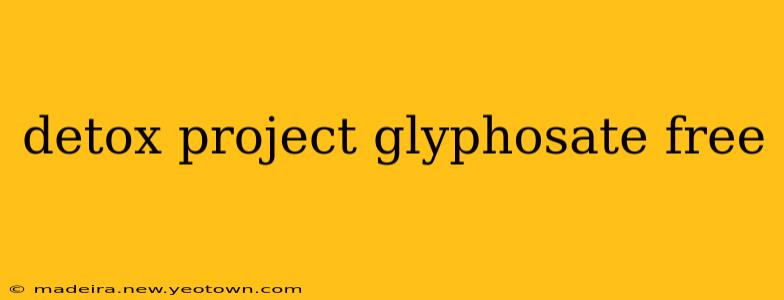Embarking on a Glyphosate-Free Detox Journey: A Holistic Approach
The discovery of glyphosate, a widely used herbicide, in our food and environment has sparked a growing interest in detoxifying our bodies. This isn't a quick fix; it's a holistic project requiring dedication and understanding. This journey isn't about fear-mongering, but about empowered choice and informed action towards a healthier lifestyle. Let's explore how to navigate this path effectively.
What is Glyphosate and Why Detox?
Glyphosate, the active ingredient in Roundup, is a systemic herbicide that kills plants by disrupting their essential metabolic processes. Its widespread use in agriculture means it's found in many foods, even those labeled "organic" (though to a lesser extent). While long-term effects are still being studied, concerns about its potential impact on human health, including gut microbiome disruption and potential links to certain illnesses, fuel the desire for a glyphosate-free lifestyle. This detox isn't about eradicating every trace, but about minimizing exposure and supporting the body's natural detoxification processes.
How Can I Reduce Glyphosate Exposure?
This is the cornerstone of any successful glyphosate-free detox. It's about making conscious choices in your daily life.
-
Choose Organic: Opting for certified organic produce drastically reduces glyphosate exposure. Look for labels and support farmers committed to sustainable practices. However, remember that even organic products can contain trace amounts.
-
Wash Your Produce: Thoroughly washing fruits and vegetables, even organic ones, helps remove surface residues. Consider using a produce wash specifically designed to remove pesticides.
-
Eat a Diverse Diet: A varied diet rich in fruits, vegetables, and whole grains provides the nutrients your body needs to support its natural detoxification pathways.
-
Cook at Home More Often: Cooking at home gives you greater control over ingredients and reduces exposure to potentially contaminated processed foods.
What Foods Should I Avoid or Limit?
Certain foods are more likely to contain higher levels of glyphosate residue. While complete avoidance isn't always practical, mindful reduction is key. These include:
- Processed Foods: Many processed foods contain glyphosate either directly or indirectly through contaminated ingredients.
- Soy Products: Soybeans are often treated with glyphosate, leading to higher levels in products like soy milk, tofu, and soy sauce. Opt for organically produced soy products whenever possible.
- Corn Products: Corn is another crop heavily treated with glyphosate. Be mindful of corn-based products like corn syrup and corn flour.
- Wheat: While not as heavily sprayed as corn or soy, conventionally grown wheat can still contain glyphosate residues.
What Supplements Can Support a Glyphosate Detox?
Several supplements are touted to support detoxification. Remember to consult with a healthcare professional before starting any supplement regimen:
- Chlorella: This single-celled green algae is known for its ability to bind to toxins and support their elimination.
- Activated Charcoal: It's often used to bind to toxins in the digestive tract.
- Cilantro: Some believe cilantro helps chelate (bind to and remove) heavy metals, potentially assisting in overall detoxification.
What are the Key Steps in a Glyphosate Detox Plan?
There isn't a single, universally accepted "glyphosate detox plan." The key lies in a holistic approach:
- Reduce Exposure: Prioritize organic produce, wash thoroughly, and cook more often.
- Support Detoxification: Eat a nutrient-rich diet, stay hydrated, and consider appropriate supplements under professional guidance.
- Listen to Your Body: Pay attention to any symptoms and adjust your approach as needed.
- Focus on Overall Wellness: Prioritize sleep, stress management, and regular exercise – all crucial for overall health and detoxification.
Is a Glyphosate Detox Right for Me?
The decision to undertake a glyphosate-free detox is a personal one. If you're concerned about glyphosate exposure and its potential health implications, taking steps to minimize exposure and support your body's natural detoxification mechanisms can be a valuable part of a healthy lifestyle. However, it's essential to consult with a healthcare professional, especially if you have pre-existing health conditions or are taking medications. They can offer personalized advice and help you create a safe and effective plan. Remember, this is a long-term commitment to wellness, not a quick fix.

